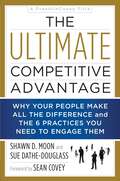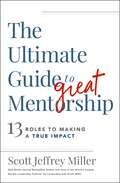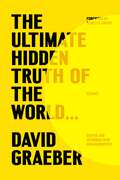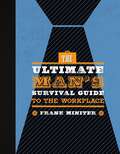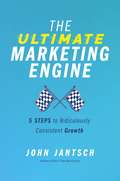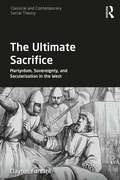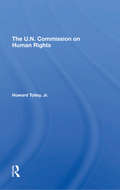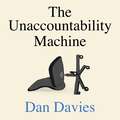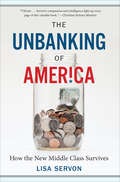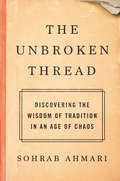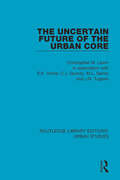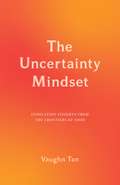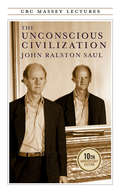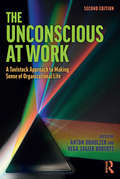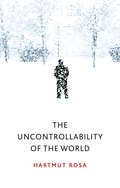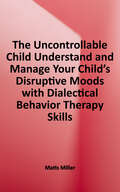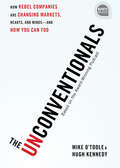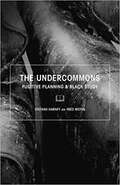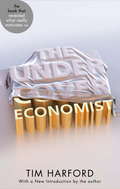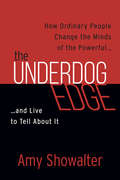- Table View
- List View
The Ultimate Cockney Geezer's Guide to Rhyming Slang
by Geoff TibballsWould you Adam and Eve it? Over a hundred years after it was first heard on the streets of Ye Olde London Towne, Cockney rhyming slang is still going strong, and this book contains the most comprehensive and entertaining guide yet.Presented in an easy-to-read A to Z format, it explains the meaning of hundreds of terms, from old favourites such as apples and pears (stairs) and plates of meat (feet) to the more obscure band of hope (soap) and cuts and scratches (matches) through to modern classics such as Anthea Turner (earner) and Ashley Cole (own goal), as well as providing fascinating background info and curious Cockney facts throughout. Also included are a series of language tests so that readers can brush up on their newfound knowledge on their way to becoming a true Cockney Geezer.All in all, The Ultimate Cockney Geezer's Guide to Rhyming Slang is well worth your bread and honey to have a butcher's.
The Ultimate Competitive Advantage: Why Your People Make All the Difference and the 6 Practices You Need to Engage Them
by Shawn D Moon Sue Dathe-Douglass&“People are our most important asset." Every company pays lip service to this platitude, but how many companies really embrace it? People are what sustain—or ruin—your brand. If your people are not excited about the company, indifferent, or even alienated from it, your competitive advantage will disappear. In The Ultimate Competitive Advantage, FranklinCovey experts Shawn D. Moon and Sue Dathe-Douglass lay out the steps leaders can take to tap into their companies' most valuable and unique resource: people. When you promote a company of proactive and engaged employees who create a winning culture, sustain it, leverage it, and make it work no matter what comes your way, your business rises above the rest. From the company that brought you The 7 Habits of Highly Effective People, The Ultimate Competitive Advantage offers six highly effective practices that will propel your company to success by unleashing the potential of your people. Each practice in The Ultimate Competitive Advantage is based on fundamental principles that hold true across all industries, from the necessity of being proactive to the importance of building win-win relationships. Implementing these practices is the key to making a distinctive difference in the marketplace. The Ultimate Competitive Advantage will enable your company to achieve remarkable results and become an industry standout by leveraging your most important asset: your people.
The Ultimate Guide to Great Mentorship: 13 Roles to Making a True Impact
by Scott Jeffrey MillerEasy, practical guidance on how to make the most out of your mentorship journey.Being a great mentor leads to thriving, engaged employees on both sides of the mentor-mentee relationship and helps drive renewed purpose. There are growing expectations and interest in business today that leaders will make themselves available as mentors to provide future leaders growth opportunities and help them grow in their roles. There is also plenty of evidence that shows how impactful mentorship can be for the mentors when approached with the right mindset. The Ultimate Guide to Great Mentorship walks mentors through the mentorship journey, from setting initial expectations and goals, to tracking progress, to identifying when it is time to find new opportunities. Filled with practical sample plans and forms to make the experience much more impactful for all parties, this timely guide takes the ambiguity out of how to be a great mentor.Learn how mentor-mentee relationships work best for both parties.See how other top leaders approach mentorship and what works and what doesn&’t.Keep your mentorship journey on track with practical forms and timelines to work on with your mentee.See how being a great mentor leads to personal and professional growth and renewal for you as well as your mentee!
The Ultimate Hidden Truth of the World . . .: Essays
by David GraeberDrawn from more than two decades of pathbreaking writing, the iconic and bestselling David Graeber's most important essays and interviews."The ultimate hidden truth of the world is that it is something that we make, and could just as easily make differently," wrote David Graeber. A renowned anthropologist, activist, and author of such classic books as Debt and the breakout New York Times bestseller The Dawn of Everything (with David Wengrow), Graeber was as well-known for his sharp, lively essays as he was for his iconic role in the Occupy movement and his paradigm-shifting tomes.There are converging political, economic, and ecological crises, and yet our politics is dominated by either business as usual or nostalgia for a mythical past. Thinking against the grain, Graeber was one of the few who dared to imagine a new understanding of the past and a liberatory vision of the future—to imagine a social order based on humans’ fundamental freedom. In essays published over three decades and ranging across the biggest issues of our time— inequality, technology, the identity of “the West,” democracy, art, power, anger, mutual aid, and protest—he challenges the old assumptions about political life. A trenchant critic of the order of things, and driven by a bold imagination and a passionate commitment to human freedom, he offers hope that our world can be different.During a moment of daunting upheaval and pervasive despair, the incisive, entertaining, and urgent essays collected in The Ultimate Hidden Truth of the World . . . , edited and with an introduction by Nika Dubrovsky and with a foreword by Rebecca Solnit, make for essential and inspiring reading. They are a profound reminder of Graeber’s enduring significance as an iconic, playful, necessary thinker.
The Ultimate Man's Survival Guide to the Workplace
by Frank MiniterThe long overdue follow-up to Miniter's bestselling The Ultimate Man's Survival Guide: Rediscovering the Lost Art of Manhood, this hilarious and colorful guide to surviving the modern office is an absolute must for any man whose instincts are frequently leading him into saying and doing the absolute wrong thing in the workplace. And yes, we're talking about you.
The Ultimate Marketing Engine: 5 Steps to Ridiculously Consistent Growth
by John JantschA step-by-step system for creating customers and clients for life.In a world that&’s difficult for business professionals to cut through noise to create relationships with their customers, organizations that focus on converting their customers to members and helping them achieve lasting transformation rather than simply offering the transaction of the moment are winning.The Ultimate Marketing Engine teaches you how to develop a system to take every customer from where they are to where they want to be by building on the innovative principles first brought to the marketing world in Duct Tape Marketing and honed over three decades of working with thousands of businesses.In this book, you will learn:Why strategy must come before tactics.How to narrow your focus and choose only ideal customers.Why no one wants what you sell – and what they actually want.How to use story and narrative as the voice of strategy.How to construct the perfect customer journey.How to grow your business with your customers. This bookintroduces the Customer Success Track, an innovative new approach to marketing strategy that will transform how you view your business, your marketing and how you view every customer.The Ultimate Marketing Engine will help you take control of your marketing while creating ridiculously consistent business growth.
The Ultimate Sacrifice: Martyrdom, Sovereignty, and Secularization in the West (Classical and Contemporary Social Theory)
by Clayton FordahlThis book presents an interpretive, macro-historical, and sociological account of martyrdom. Moving away from the notion of martyrdom as an object of individual behavior and seeing it instead as a significant cultural work performed by communities in the wake of a violent death, it provides a novel interpretation of Western political and religious history. In addition to thus redressing the disproportionate attention given to the concept’s relationship to Islam, the author offers a new perspective on two defining historical processes: secularization and the rise of modern sovereignty in the form of the nation-state. An innovative analysis of the role of sacrifice in contemporary culture, which constitutes a timely critique of long-dominant theories of disenchantment and the privatization of religion, The Ultimate Sacrifice will appeal to sociologists and social theorists with interests in religion, politics, and the connection between the two.
The Un Commission On Human Rights
by Howard Tolley JrIn 1946, the United Nations Commission on Human Rights became the first international body empowered to promote global human rights. During its first twenty years, the Commission established most of the contemporary standards of human rights. Increased social awareness in the 1960s enabled the Commission to respond to specific complaints from individuals and nongovernmental organizations and to pressure offending governments by using various measures that ranged from exhortation and mediation to sanctions designed to isolate violators. These enforcement activities have increased the Commission's visibility and have dramatically transformed its operation. Dr. Tolley's thematic history of the Commission offers important insights into states' political conduct in international human rights organizations, the evolving legal and institutional means of preventing human rights violations, and the difficulties encountered when an intergovernmental body is pressed to provide impartial protection to citizens against abuse by their own government.
The Unaccountability Machine: Why Big Systems Make Terrible Decisions - and How The World Lost its Mind
by Dan Davies'A corporation, or a government department isn't a conscious being, but it is an artificial intelligence. It has the capability to take decisions which are completely distinct from the intentions of any of the people who compose it. And under stressful conditions, it can go stark raving mad.'When we avoid taking a decision, what happens to it? In The Unaccountability Machine, Dan Davies examines why markets, institutions and even governments systematically generate outcomes that everyone involved claims not to want. He casts new light on the writing of Stafford Beer, a legendary economist who argued in the 1950s that we should regard organisations as artificial intelligences, capable of taking decisions that are distinct from the intentions of their members. Management cybernetics was Beer's science of applying self-regulation in organisational settings, but it was largely ignored - with the result being the political and economic crises that that we see today. With his signature blend of cynicism and journalistic rigour, Davies looks at what's gone wrong, and what might have been, hadthe world listened to Stafford Beer when it had the chance.
The Unbanking Of America: How the New Middle Class Survives
by Lisa Servon&“[A] startling and absorbing exposé . . . Required reading for fans of muckraking authors like Barbara Ehrenreich.&”—Publishers Weekly, starred review &“Exceptional . . . thorough, and even gut-wrenching. A significant contribution.&”—American Prospect Why Americans are fleeing our broken banking system in growing numbers, and how alternatives are rushing in to do what banks once did What do an undocumented immigrant in the South Bronx, a high-net-worth entrepreneur, and a twenty-something graduate student have in common? All three are victims of our dysfunctional mainstream bank and credit system. Nearly half of all Americans live from paycheck to paycheck, and income volatility has doubled over the past thirty years. Banks, with their high monthly fees and overdraft charges, are gouging their lower- and middle-income customers while serving only the wealthiest Americans. Lisa Servon delivers a stunning indictment of America&’s banks, together with eye-opening dispatches from inside a range of banking alternatives that have sprung up to fill the void. She works as a teller at RiteCheck, a check-cashing business in the South Bronx, and as a payday lender in Oakland. She looks closely at the workings of a tanda, an informal lending club. And she delivers engaging, hopeful portraits of the entrepreneurs reacting to the unbanking of America by designing systems to creatively serve many of us.
The Unbounded Community: Neighborhood Life and Social Structure in New York City, 1830–1875
by Kenneth A. ScherzerStick ball, stoop sitting, pickle barrel colloquys: The neighborhood occupies a warm place in our cultural memory--a place that Kenneth A. Scherzer contends may have more to do with ideology and nostalgia than with historical accuracy. In this remarkably detailed analysis of neighborhood life in New York City between 1830 and 1875, Scherzer gives the neighborhood its due as a complex, richly textured social phenomenon and helps to clarify its role in the evolution of cities.After a critical examination of recent historical renderings of neighborhood life, Scherzer focuses on the ecological, symbolic, and social aspects of nineteenth-century community life in New York City. Employing a wide array of sources, from census reports and church records to police blotters and brothel guides, he documents the complex composition of neighborhoods that defy simple categorization by class or ethnicity. From his account, the New York City neighborhood emerges as a community in flux, born out of the chaos of May Day, the traditional moving day. The fluid geography and heterogeneity of these neighborhoods kept most city residents from developing strong local attachments. Scherzer shows how such weak spatial consciousness, along with the fast pace of residential change, diminished the community function of the neighborhood. New Yorkers, he suggests, relied instead upon the "unbounded community," a collection of friends and social relations that extended throughout the city.With pointed argument and weighty evidence, The Unbounded Community replaces the neighborhood of nostalgia with a broader, multifaceted conception of community life. Depicting the neighborhood in its full scope and diversity, the book will enhance future forays into urban history.
The Unbroken Thread: Discovering the Wisdom of Tradition in an Age of Chaos
by Sohrab AhmariWe&’ve pursued and achieved the modern dream of defining ourselves—but at what cost? The New York Post op-ed editor makes a compelling case for seeking the inherited traditions and ideals that give our lives meaning.&“Ahmari&’s tour de force makes tradition astonishingly vivid and relevant for the here and now.&”—Rod Dreher, bestselling author of Live Not by Lies and The Benedict OptionAs a young father and a self-proclaimed &“radically assimilated immigrant,&” opinion editor Sohrab Ahmari realized that when it comes to shaping his young son&’s moral fiber, today&’s America comes up short. For millennia, the world&’s great ethical and religious traditions taught that true happiness lies in pursuing virtue and accepting limits. But now, unbound from these stubborn traditions, we are free to choose whichever way of life we think is most optimal—or, more often than not, merely the easiest. All that remains are the fickle desires that a wealthy, technologically advanced society is equipped to fulfill.The result is a society riven by deep conflict and individual lives that, for all their apparent freedom, are marked by alienation and stark unhappiness.In response to this crisis, Ahmari offers twelve questions for us to grapple with—twelve timeless, fundamental queries that challenge our modern certainties. Among them: Is God reasonable? What is freedom for? What do we owe our parents, our bodies, one another? Exploring each question through the life and ideas of great thinkers, from Saint Augustine to Howard Thurman and from Abraham Joshua Heschel to Andrea Dworkin, Ahmari invites us to examine the hidden assumptions that drive our behavior and, in so doing, to live more humanely in a world that has lost its way.
The Uncertain Future of the Urban Core (Routledge Library Editions: Urban Studies #16)
by Christopher M. LawOriginally published in 1988. Inner city problems in advanced countries are being exacerbated by the decentralisation of economic activities and higher income groups. Only offices and tourism offer some prospects of growth, but these vary in their potential from one city to another. This book assesses changes in the structure of urban areas, concentrating on the process of decentralisation and the consequences for the inner city and city centre. It examines and evaluates policies and makes suggestions for the future management of the city.
The Uncertainty Channel of Contagion
by Prakash Kannan Fritzi Köhler-GeibA report from the International Monetary Fund.
The Uncertainty Mindset: Innovation Insights from the Frontiers of Food
by Vaughn TanInnovation is how businesses stay ahead of the competition and adapt to market conditions that change in unpredictable and uncertain ways. In the first decade of the twenty-first century, high-end cuisine underwent a profound transformation. Once an industry that prioritized consistency and reliability, it turned into one where constant change was a competitive necessity. A top restaurant’s reputation and success have become so closely bound up with its ability to innovate that a new organizational form, the culinary research and development team, has emerged. The best of these R&D teams continually expand the frontiers of food—they invent a constant stream of new dishes, new cooking processes and methods, and even new ways of experiencing food. How do they achieve this nonstop novelty? And what can culinary research and development teach us about how organizations innovate?Vaughn Tan opens up the black box of elite culinary R&D to provide essential insights. Drawing on years of unprecedented access to the best and most influential culinary R&D teams in the world, he reveals how they exemplify what he calls the uncertainty mindset. Such a mindset intentionally incorporates uncertainty into organization design rather than simply trying to reduce risk. It changes how organizations hire, set goals, and motivate team members and leads organizations to work in highly unconventional ways. A revelatory look at the R&D kitchen, The Uncertainty Mindset upends conventional wisdom about how to organize for innovation and offers practical insights for businesses trying to become innovative and adaptable.
The Unconscious Civilization (The CBC Massey Lectures)
by John Ralston SaulGovernor General's Award Winner Tenth Anniverary Edition, with a new preface Our society, John Ralston Saul argues in his 1995 CBC Massey Lectures, is only superficially based on the individual and democracy. Increasingly it is conformist and corporatist, a society in which legitimacy lies with specialist or interest groups and decisions are made through constant negotiations between these groups. The paradox of our situation is that knowledge has not made us conscious. Instead, we have sought refuge in a world of illusion where language is cut off from reality. Reconnecting language to reality, clarifying what we mean by individualism and democracy, making these realities central to the citizen's life, identifying ideologies in order to control them, these are among the first elements of equilibrium which Saul proposes in these lectures.
The Unconscious at Work: A Tavistock Approach to Making Sense of Organizational Life
by Anton Obholzer Vega Zagier RobertsWhy do our organizations so often seem to be less than the sum of their parts? What undermines effectiveness and morale, and gets in the way of achieving what we set out to do? The Unconscious at Work, Second Edition draws on a body of thinking and practice which has developed over the past 70 years, often referred to as 'the Tavistock approach' or 'systems-psychodynamics'. All the contributors are practising consultants who draw on this framework, bringing it alive and making it useful to any reader – manager, leader or consultant, regardless of whether they have any prior familiarity with the underlying concepts – who is curious about what might be driving the puzzling or stressful situations they find in their workplace. The First Edition was addressed to people working in 'the human services': health, social care and education. Since it was published in 1994, there has been growing interest in the business world, and in understanding more about the 'irrational' side of organizational life. Therefore, this Second Edition includes an entirely new section where the key ideas are revisited and illustrated with case studies from a wide range of business organizations, from large corporations to start-ups and family businesses. The aim, however remains the same: to enlarge readers' existing sense-making 'tool-kits' so that they can look at themselves and their organizations with fresh eyes, deepening the emotional intelligence they bring to bear on the challenges they face and providing new possibilities for action. The Unconscious at Work, Second Edition is for managers, leaders, consultants, and anyone working in organizations who has been puzzled, disturbed or challenged by their experiences at work.
The Uncontrollability of the World
by Hartmut RosaThe driving cultural force of that form of life we call ‘modern’ is the desire to make the world controllable. Yet it is only in encountering the uncontrollable that we really experience the world – only then do we feel touched, moved and alive. A world that is fully known, in which everything has been planned and mastered, would be a dead world. Our lives are played out on the border between what we can control and that which lies outside our control. But because we late-modern human beings seek to make the world controllable, we tend to encounter the world as a series of objects that we have to conquer, master or exploit. And precisely because of this, ‘life,’ the experience of feeling alive and truly encountering the world, always seems to elude us. This in turn leads to frustration, anger and even despair, which then manifest themselves in, among other things, acts of impotent political aggression. For Rosa, to encounter the world and achieve resonance with it requires us to be open to that which extends beyond our control. The outcome of this process cannot be predicted, and this is why moments of resonance are always concomitant with moments of uncontrollability. This short book – the sequel to Rosa’s path-breaking work on social acceleration and resonance – will be of great interest students and scholars in sociology and the social sciences and to anyone concerned with the nature of modern social life.
The Uncontrollable Child: Understand and Manage Your Child's Disruptive Moods With Dialectical Behavior Therapy Skills
by Matis MillerEvidence-based skills, insight, and methods drawn from dialectical behavior therapy (DBT) to help you gain a greater understanding of your child's behavior, parent them with compassion and confidence, and restore peace to your home. Is your child extremely irritable most of the time? Do they have difficulty interpreting social cues? Are they impulsive and prone to outbursts or explosive rages? <p><p>Parenting a child who has emotional dysregulation can be a bumpy ride. You've probably received advice—some of it unsolicited—from friends, teachers, and family members. But strategies and techniques that work for other kids are usually ineffective when it comes to your unique child, and can even lead to more stress for everyone in your family. <p><p>The Uncontrollable Child is here to help. Written for parents of children with emotion dysregulation disorders, including disruptive mood dysregulation disorder (DMDD), The Uncontrollable Child is a lifeline. It contains a powerful set of skills based in dialectical behavior therapy (DBT)--including mindfulness, validation, limit-setting, and behavior-shaping—to help you better understand your child and their behavior, and successfully find balance between acceptance and change, flexibility and consistency, and limits and love. As a parent, you want the very best for your child, but if you have a child with explosive emotions, you need extra help. Let this book guide you toward creating a nurturing, healthy, and loving environment in which your whole family can thrive.
The Unconventionals: How Rebel Companies Are Changing Markets, Hearts, and Minds-and How You Can Too (Ignite Reads #0)
by Hugh Kennedy Mike O'TooleWhat do electric shavers, craft beer, and DNA tests all have in common? They were all revolutionized by the Unconventionals. We've had our expectations turned upside down by leading brands like Converse, General Electric, and Waze simply because they saw things differently. How did they do that? By simply questioning the prevailing wisdom which then created outsized results and lasting change. Based on the award-winning podcast, The Unconventionals chronicles the amazing stories behind these solid business successes and shows you how reinventing your company (or starting a new one) can be easier than you think! Through in-depth interviews with the business visionaries who turned the unexpected into the expected you will learn how to become unconventional, too!
The Undeniable Favor of God: Achieving My Present by Walking in the Light of God's Love
by Elizabeth Jean BruceA licensed psychologist and trauma expert shares the story of how she met life&’s challenges and achieved personal fulfillment through faith. Having a sense of purpose significantly contributes to the quality of our lives. Many people experience God-given &“callings&” to achieve distinctive goals in life. These yearnings give us a sense of fulfillment by showing how we fit into the wholeness of creation. But discovering our purpose and establishing a major long-term goal are only the first steps of the journey. We must also understand what is required of us to reach our final destination, and make sure to note the milestones we achieve along the way. There will be difficult periods during the journey. To see our way through them, it helps to surround ourselves with people who strengthen our emotional, physical, and spiritual well-being. We must also utilize our faith in God, who keeps us fortified to endure disheartening times. Dr. Bruce believes that wonderful things happen as life unfolds. In The Undeniable Favor of God, she teaches others how to focus on the beauty, truth, and light of life.
The Undercommons: Fugitive Planning and Black Study
by Stefano Harney Fred MotenIn this series of essays, Fred Moten and Stefano Harney draw on the theory and practice of the black radical tradition as it supports, inspires, and extends contemporary social and political thought and aesthetic critique. <p><p> Today the general wealth of social life finds itself confronted by mutations in the mechanisms of control: the proliferation of capitalist logistics, governance by credit, and the management of pedagogy. Working from and within the social poesis of life in THE UNDERCOMMONS, Moten and Harney develop and expand an array of concepts: study, debt, surround, planning, and the shipped. <p><p> On the fugitive path of an historical and global blackness, the essays in this volume unsettle and invite the reader to the self-organised ensembles of social life that are launched every day and every night amid the general antagonism of THE UNDERCOMMONS.
The Undercover Economist
by Tim HarfordWho makes most money from the demand for cappuccinos early in the morning at Waterloo Station? Why is it impossible to get a foot on the property ladder? How does the Mafia make money from laundries when street gangs pushing drugs don't? Who really benefits from immigration? How can China, in just fifty years, go from the world's worst famine to one of the greatest economic revolutions of all time, lifting a million people out of poverty a month?Looking at familiar situations in unfamiliar ways, THE UNDERCOVER ECONOMIST is a fresh explanation of the fundamental principles of the modern economy, illuminated by examples from the streets of London to the booming skyscrapers of Shanghai to the sleepy canals of Bruges. Leaving behind textbook jargon and equations, Tim Harford will reveal the games of signals and negotiations, contests of strength and battles of wit that drive not only the economy at large but the everyday choices we make.
The Undercover Economist: Exposing Why The Rich Are Rich, Why The Poor Are Poor--and Why You Can Never Buy A Decent Used Car!
by Tim HarfordWho makes most money from the demand for cappuccinos early in the morning at Waterloo Station? Why is it impossible to get a foot on the property ladder? How does the Mafia make money from laundries when street gangs pushing drugs don't? Who really benefits from immigration? How can China, in just fifty years, go from the world's worst famine to one of the greatest economic revolutions of all time, lifting a million people out of poverty a month?Looking at familiar situations in unfamiliar ways, THE UNDERCOVER ECONOMIST is a fresh explanation of the fundamental principles of the modern economy, illuminated by examples from the streets of London to the booming skyscrapers of Shanghai to the sleepy canals of Bruges. Leaving behind textbook jargon and equations, Tim Harford will reveal the games of signals and negotiations, contests of strength and battles of wit that drive not only the economy at large but the everyday choices we make.
The Underdog Edge: How Ordinary People Change the Minds of the Powerful . . . and Live to Tell About It
by Amy ShowalterA prominent consultant reveals secrets to help you influence and persuade others—even when you aren&’t in a position of power. We all have occasions in which we want or need to persuade someone of greater clout, prestige, or authority to see things our way. There are books that show how to effect change from a leadership position or how to work with peers within your own organization—but what can you do when you need to exert &“upward influence&” with decision makers who can help you achieve your goals? In this book, a popular speaker and successful consultant with expertise in grassroots efforts shows which tactics are most successful when you&’re the underdog. She also shares real-world stories of everyday people who have achieved persuasion success in politics and business with someone up the food chain, the peer-reviewed science behind their success—as well as insights from those whose minds they changed.

